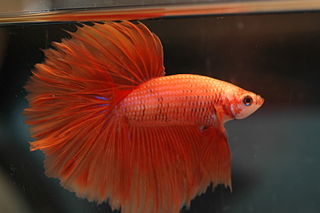
The house crow, also known as the Indian, greynecked, Ceylon or Colombo crow, is a common bird of the crow family that is of Asian origin but now found in many parts of the world, where they arrived assisted by shipping. It is between the jackdaw and the carrion crow in size but is slimmer than either. The forehead, crown, throat and upper breast are a richly glossed black, whilst the neck and breast are a lighter grey-brown in colour. The wings, tail and legs are black. There are regional variations in the thickness of the bill and the depth of colour in areas of the plumage.

Fouquieria splendens is a plant indigenous to the Sonoran Desert and Chihuahuan Desert and Colorado Desert in the Southwestern United States, and northern Mexico.

The Siamese fighting fish, commonly known as the betta, is a freshwater fish native to Southeast Asia, namely Cambodia, Laos, Myanmar, Malaysia, Indonesia, Thailand, and Vietnam. It is one of 73 species of the genus Betta, but the only one eponymously called "betta", owing to its global popularity as a pet; Betta splendens are among the most popular aquarium fish in the world, due to their diverse and colorful morphology and relatively low maintenance.

Fruit syrups or fruit molasses are concentrated fruit juices used as sweeteners.

The splendid fairywren is a passerine bird in the Australasian wren family, Maluridae. It is also known simply as the splendid wren or more colloquially in Western Australia as the blue wren. The splendid fairywren is found across much of the Australian continent from central-western New South Wales and southwestern Queensland over to coastal Western Australia. It inhabits predominantly arid and semi-arid regions. Exhibiting a high degree of sexual dimorphism, the male in breeding plumage is a small, long-tailed bird of predominantly bright blue and black colouration. Non-breeding males, females and juveniles are predominantly grey-brown in colour; this gave the early impression that males were polygamous as all dull-coloured birds were taken for females. It comprises several similar all-blue and black subspecies that were originally considered separate species.

Trichosia is a genus of fungus gnats that feed on decaying organic matter and fungi.

Hylocomium splendens, commonly known as glittering woodmoss, splendid feather moss, stairstep moss, and mountain fern moss, is a perennial clonal moss with a widespread distribution in Northern Hemisphere boreal forests. It is commonly found in Europe, Russia, Alaska and Canada, where it is often the most abundant moss species. It also grows in the Arctic tundra and further south at higher elevations in, for example, northern California, western Sichuan, East Africa, Australia, New Zealand and the West Indies. In Scotland it is a characteristic species of the Caledonian Forest. Under the UK's national vegetation classification system, pinewood community W18 is named as "Pinus sylvestris-Hylocomium splendens woodland", indicating its significance in this ecosystem.

Betta is a large genus of small, active, often colorful, freshwater ray-finned fishes, in the gourami family (Osphronemidae). The best known Betta species is B. splendens, commonly known as the Siamese fighting fish and often kept as an aquarium pet.
Pseudocharis is a genus of tiger moths in the family Erebidae. It was erected by Herbert Druce in 1884.

Scaritinae is a large subfamily of beetles in the family Carabidae, containing more than 2400 species in over 140 genera. They are found worldwide.
Carenum is a genus of beetles in the family Carabidae, containing the following species:
Carenum imitator is a species of ground beetle in the subfamily Scaritinae. It was described by Sloane in 1897.
Carenum brisbanense is a species of ground beetle in the subfamily Scaritinae. It was described by Castelnau in 1867.
Carenum carbonarium is a species of ground beetle in the subfamily Scaritinae. It was described by Castelnau in 1867.
Carenum devastator is a species of ground beetle in the subfamily Scaritinae. It was described by Castelnau in 1867.
Carenum odewahnii is a species of ground beetle in the subfamily Scaritinae. It was described by Castelnau in 1867.
Carenum purpuratum is a species of ground beetle in the subfamily Scaritinae. It was described by Castelnau in 1867.
Carenum episcopale is a species of ground beetle in the subfamily Scaritinae. It was described by Castelnau in 1867.
Carenum filiforme is a species of ground beetle in the subfamily Scaritinae. It was described by Castelnau in 1867.
Sphaeroderma is a large genus of flea beetles in the family Chrysomelidae, with some 250 species from the Old World.








